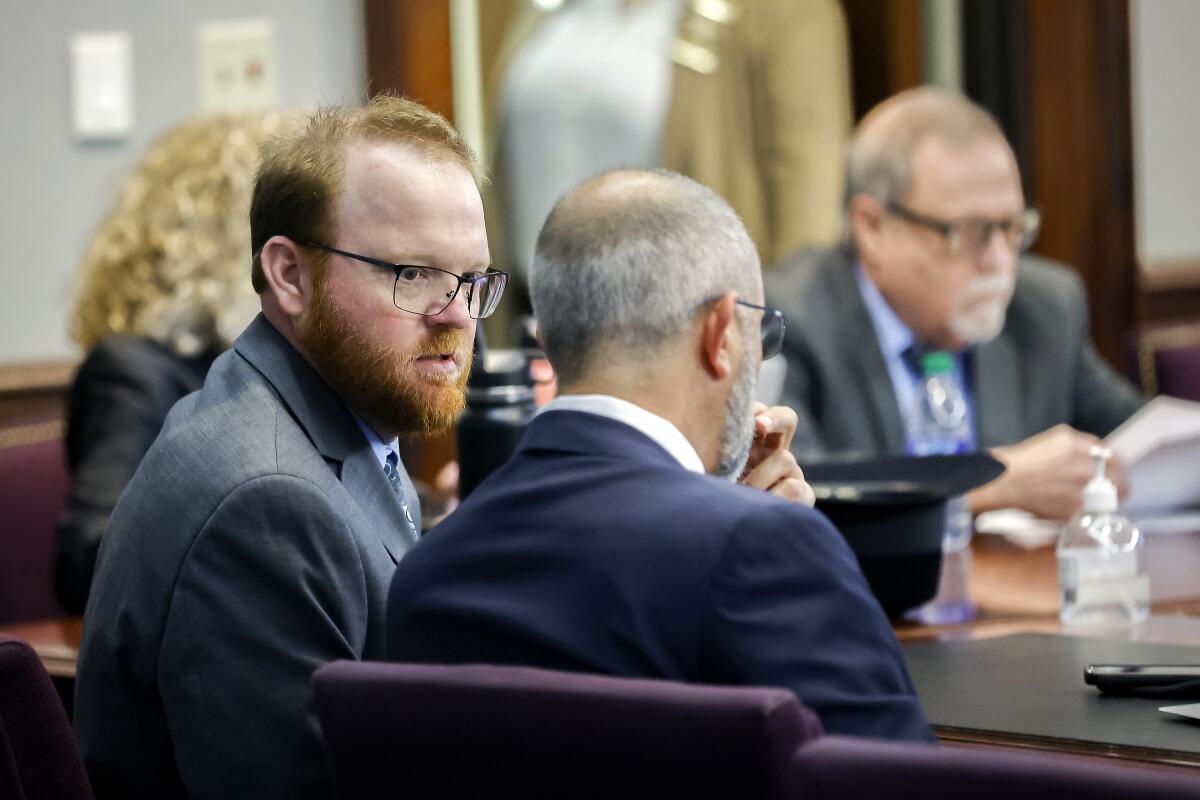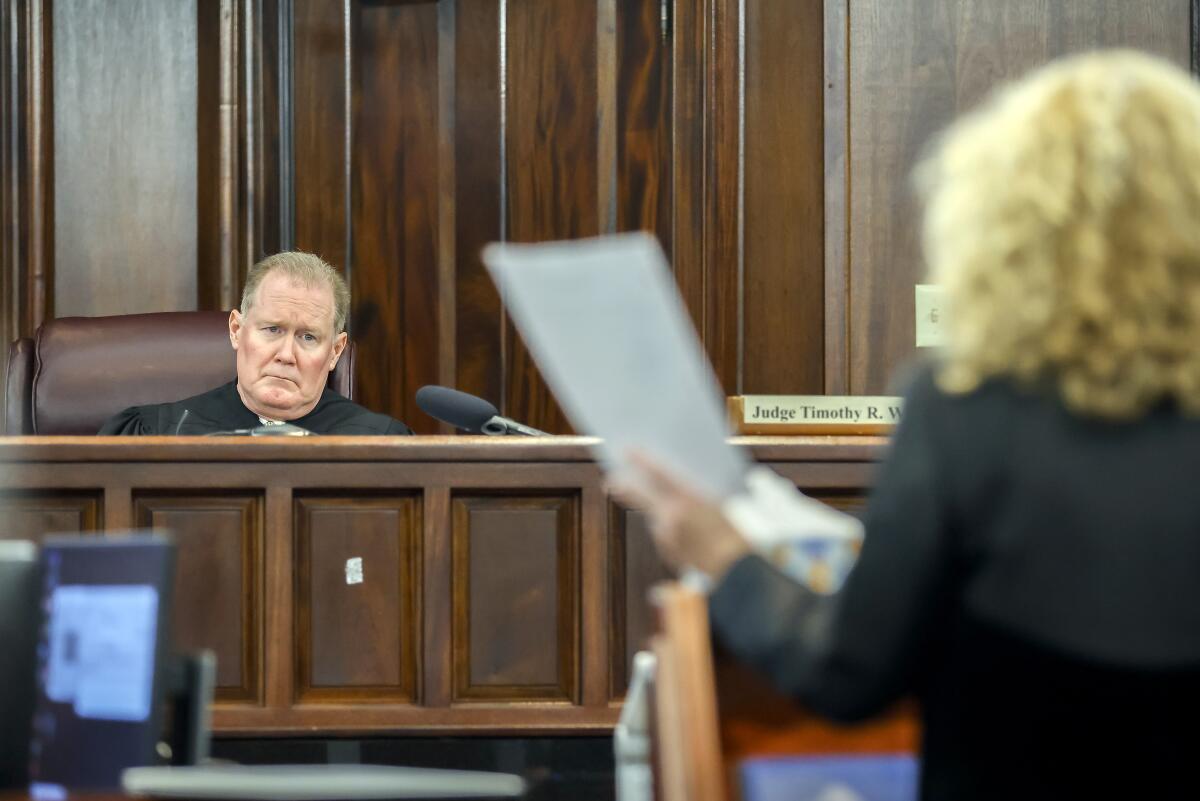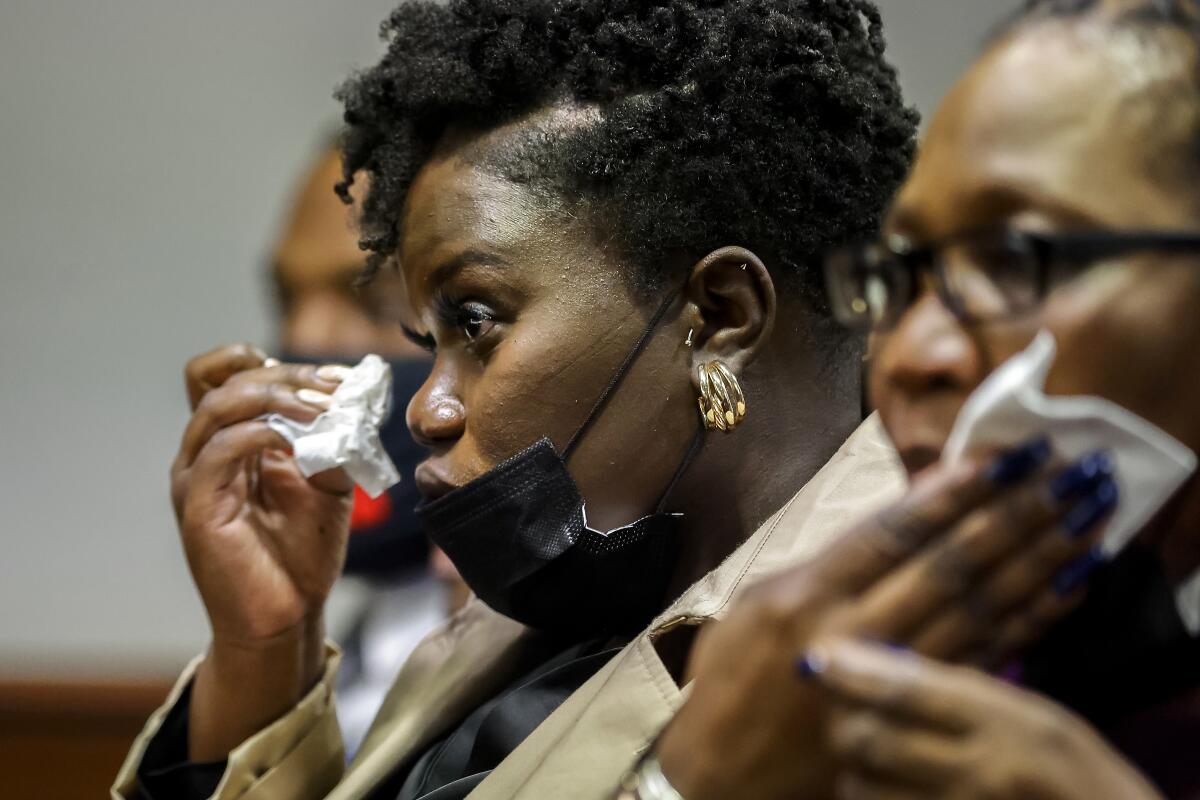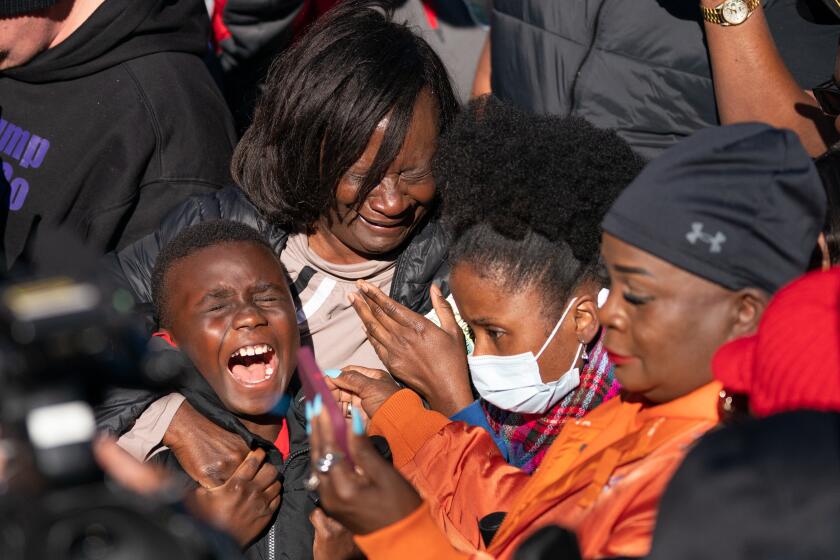Three white men sentenced to life for the murder of Ahmaud Arbery

- Share via
ATLANTA — A Georgia judge Friday sentenced two white men to life in prison without the possibility of parole for the murder of Ahmaud Arbery, a 25-year-old Black man whose 2020 killing helped push a national debate on racial profiling and vigilantism. A third man also convicted of murdering Arbery was sentenced to life, but with the possibility of parole.
Gregory McMichael, 66, and son Travis McMichael, 35, were sentenced for their role in chasing Arbery with their pickups in a suburban community near Brunswick, Ga., and killing him. Travis McMichael fatally shot Arbery, who was unarmed. Their neighbor, William “Roddie” Bryan, 52, was sentenced to life in prison but will be eligible for parole after serving 30 years.

Speaking to the court before sentencing, Superior Court Judge Timothy R. Walmsley said Arbery was “hunted down and shot” in a “callous” killing that occurred because the defendants sought confrontation.
After holding one minute of silence in the courtroom — a minute that the judge said represented a fraction of the time Arbery ran through the Satilla Shores community near Brunswick — Walmsley said he “kept coming back to the terror that must have been in the mind of the young man.”
While Arbery’s family, the community of Brunswick and people across the nation sought closure, Walmsley said his role in sentencing was to provide accountability.
“We are all accountable for our own actions,” Walmsley said. “Sometimes, in today’s day and age, that statement is lost upon many.... Today demonstrates that everybody is accountable to the rule of law. Taking the law into your own hands is a dangerous endeavor.”
Three white men were found guilty of murder Wednesday in the shooting death of Ahmaud Arbery, a 25-year-old Black man
The three men were found guilty the day before Thanksgiving by a mostly white jury, prompting family and friends to claim that justice had, finally, been served. The case, many civil rights activists said, represented a landmark victory against racism in the criminal justice system.
On Friday morning, before the judge set punishments for the three defendants, Arbery’s family spoke inside the Glynn County Courthouse of their loss and urged the judge to impose maximum sentences.
“These men have chose to lie and attack my son and his surviving family. They each have no remorse and do not deserve any leniency,” Wanda Cooper-Jones, Arbery’s mother, said in her victim impact statement. “They chose to treat him differently than other people who frequently visited their community, and when they couldn’t sufficiently scare him or intimidate him, they killed him.”

The McMichaels and Bryan chased down Arbery in pickups on Feb. 23, 2020 — a quiet Sunday afternoon — as he ran through the Satilla Shores subdivision near the coastal city of Brunswick.
The men later said they were attempting to make a citizen’s arrest when they pursued Arbery. Travis McMichael testified that he was acting in self-defense because he fired only after Arbery, in his final moments, had lunged for him and his gun.
Prosecutors did not seek the death penalty against the three defendants. Under Georgia law, murder carries a mandatory sentence of life in prison. In addition to the murder convictions, the men were also found guilty of aggravated assault, false imprisonment and criminal attempt to commit false imprisonment, counts with maximum prison terms from five to 20 years.
During the trial, defense attorneys argued that Arbery was killed as he resisted a justified legal citizen’s arrest attempt and that the three defendants sought to stop and detain him after he was seen running from a home under construction.
Before the men were sentenced, defense lawyers sought leniency.
Robert Rubin, an attorney for Travis McMichael, argued that his client was a devoted father and a former member of the Coast Guard whose actions might have been reckless, but was “not evidence of a soul so blackened as to deserve to spend the rest of his life in prison.”
“Judge, you can send a message that four minutes of conduct does not erase a life well-lived and that after punishment, there is opportunity for redemption,” he said.
Laura Hogue said her client, Gregory McMichael, was a “man of goodness” who had no criminal record.
Kevin Gough, a lawyer for Bryan, emphasized that his client was unarmed and did not know the McMichaels had guns until moments before the shooting. His client also expressed remorse immediately after the shooting and offered law enforcement key evidence, including cellphone video of the fateful encounter.
Lead prosecutor Linda Dunikoski allowed for leniency for Bryan but urged the judge to impose harsher sentences on the McMichaels because they had showed “no remorse and certainly no empathy.” The McMichaels, Dunikoski said, should be judged on their conduct during the four minutes that culminated in Arbery’s death.
“That four minutes of conduct wasn’t just four minutes of conduct. It was a culmination of vigilantism … without any real understanding or consideration of the consequences,” she said.
Before sentencing, Walmsley ran through the actions and apparent level of remorse of each defendant. Gregory McMichael tried early on after the shooting to establish a narrative, he said, referring to Arbery as “trapped like a rat” and saying he told Arbery, “Stop or I’ll blow your ... head off.”
Travis McMichael claimed to be in shock after the shooting, but the judge said he seemed more concerned for his own well-being. As Arbery lay dead on the street, he noted, McMichael commented, “This is the worst day of my life.”
Walmsley singled out Bryan as different from the McMichaels, noting that right after the shooting, Bryan “demonstrated that he had grave concerns that what had occurred should not have occurred.”
Still, the judge said, Bryan joined the McMichaels in chasing down Arbery, calling out “you all got him,” and a jury ultimately convicted Bryan of felony murder.
Civil rights attorney Benjamin Crump represents Arbery’s family.
“What we’ve called for from the outset is that Ahmaud’s killers be treated as a Black man would be — no more, no less. And today tells us, there is progress,” Crump said in a statement.
Defense attorneys have said they plan to appeal the convictions.
In February, the three men face a separate federal trial on hate crimes and kidnapping charges — one count of interference with Arbery’s right to use a public street because of his race and one count of attempted kidnapping. The McMichaels are also charged with one count each of using, carrying and brandishing a firearm during a crime of violence.
More to Read
Sign up for Essential California
The most important California stories and recommendations in your inbox every morning.
You may occasionally receive promotional content from the Los Angeles Times.















